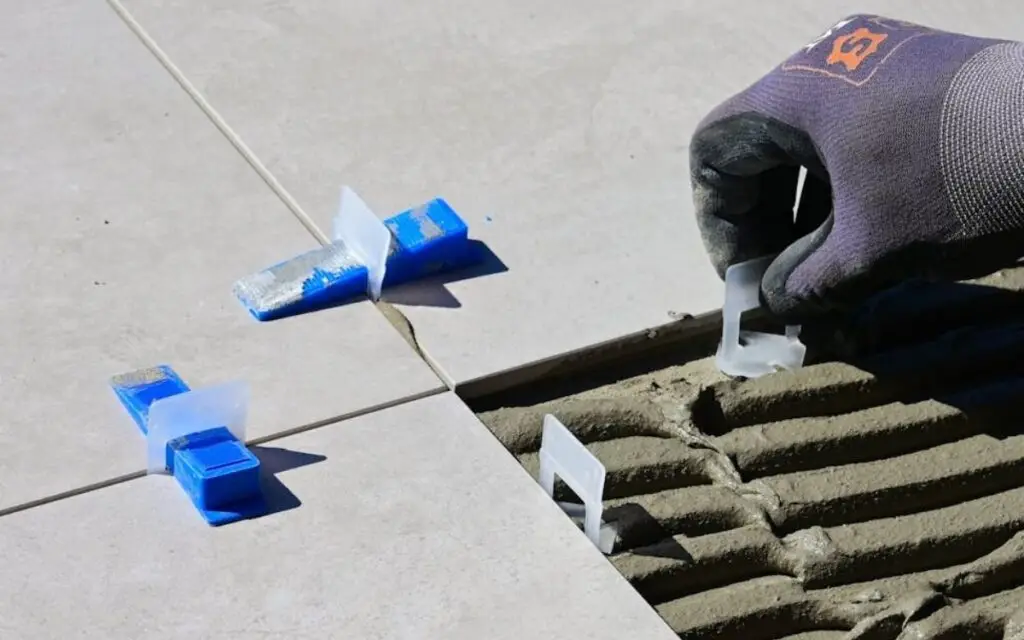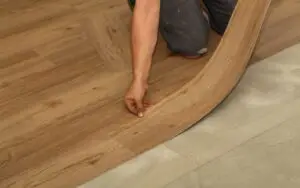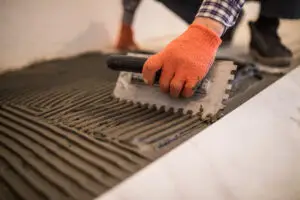Understanding the Importance of Tile Adhesives
Why Tiles Need an Adhesive
Tiles need an adhesive to bond them securely to the subfloor or wall, as the tiles on their own cannot adhere to a surface. Adhesives create a strong and durable bond that will hold the tiles in place, and will also prevent them from shifting or moving. Proper adhesive selection and application are essential for a long-lasting and safe tile installation. Professional tile installers always ensure that all adhesives are used according to their specific purpose.
Key Properties of Effective Tile Adhesives
Effective tile adhesives must have several key properties, including strong adhesion, flexibility, water resistance, and a suitable open time. Strong adhesion is needed to create a long-lasting bond, while flexibility allows for some movement without causing cracks or damage. Water resistance is essential for wet areas such as bathrooms and kitchens, and the right open time will ensure that the adhesive is still workable while the tiles are being set. Professional installers are aware of all these properties, and they will always choose the right adhesive for every project.
Types of Tile Adhesives
Thin-Set Mortar
Thin-set mortar is one of the most commonly used types of tile adhesives. It’s a cement-based product that is mixed with water or a polymer additive, which is used for setting tiles onto a subfloor or wall. Thin-set mortar is ideal for most types of tiles, and it also offers a very strong and durable bond. Professional installers have extensive knowledge of thin-set mortar and will make sure you choose the best product for your specific needs.
Modified vs. Unmodified Thin-Set
Modified thin-set mortar contains polymers that enhance its flexibility, adhesion, and water resistance, making it suitable for various types of installations. Unmodified thin-set mortar does not contain these additives, and is therefore used for more specific applications, often when you are using a waterproofing membrane, or some natural stone tiles. Professional services will be able to guide you through the process of choosing the right mortar for your specific project.
Mastic Adhesives
Mastic adhesives are a pre-mixed adhesive that are typically used for wall tile installations, and are generally not recommended for floors due to their lower strength and reduced water resistance. While they are easier to apply than thin-set mortar, they do not provide the same level of adhesion or durability, and they are not ideal for heavy weight or high traffic areas. Professional tile installers will always advise on the best type of adhesive for your specific needs, and will make sure to use the correct type of mortar for every project.
When to Use Mastic
Mastic adhesives are best used for non-load-bearing surfaces, such as walls, where moisture is not an issue, and where the adhesive will not be exposed to heavy weight or impacts. These type of adhesives are also best used for lighter tiles, and are not recommended for heavy tiles or for floor installations, so it’s always best to consult a professional to ensure you are using the correct product for every job.
Epoxy Mortars
Epoxy mortars are a more durable and also more expensive option that offers superior strength, chemical resistance, and water resistance. They are often used in demanding environments such as industrial or commercial spaces. Epoxy mortars are ideal for use in heavy traffic areas, as they will last for many years, but they also require some expertise to use correctly. Professional installers will be able to use epoxy mortars correctly and efficiently, ensuring a great result.
Ideal for Specific Environments
Epoxy mortars are best suited for environments that require high strength and chemical resistance, and also where the tiles need to withstand heavy traffic or moisture. This type of mortar is ideal for industrial spaces, or for areas such as commercial kitchens or bathrooms, where long lasting durability and strength are essential.
Specialty Adhesives
Specialty adhesives are designed for specific types of tile or installations, such as glass tiles, natural stone, or large format tiles. They offer unique properties and will guarantee a very secure and durable bond between the tile and the subfloor, and should always be used when the regular types of adhesives are not sufficient. Professional tile installers always have a variety of specialty adhesives at their disposal, ensuring they have the best tools for every type of project.
Preparing the Subfloor for Tile Adhesives
The Importance of a Clean and Level Subfloor
A clean and level subfloor is essential for proper tile adhesive application, and this means that the subfloor should be free of any dust, dirt, or debris, as well as any cracks or uneven surfaces. A properly prepared subfloor will ensure a strong and lasting bond between the tiles and the subfloor, and will also guarantee that there will be no issues in the future. Professional installers will always make sure the subfloor is perfectly prepared, as this will lead to the best possible results for their clients.
Addressing Subfloor Issues
Addressing any subfloor issues is essential for preventing installation problems. This includes repairing cracks, leveling uneven surfaces, and also making sure there are no moisture issues, which can all compromise the bond between the tiles and the adhesive. Professional services always take the time to ensure that the subfloor is in perfect condition before starting any tile installation, guaranteeing that the new tiles will be installed correctly from the beginning.
Cracks, Moisture, and Unevenness
Cracks in the subfloor can compromise the bond between the tile and the subfloor, leading to loose tiles, while excess moisture can affect the adhesive’s performance, causing it to fail. Uneven surfaces will also cause uneven tiles, and can also lead to lippage, which is why all of these issues must be addressed before any tile installation can proceed, and professionals are always ready to fix these problems, which will guarantee a long lasting and stable result.
Using Underlayment for Stability
Underlayment is often used to create a smooth and stable surface for tile installation, and it also provides extra cushioning and sound dampening. This is especially important in areas that have unstable or uneven subfloors, and choosing the correct type of underlayment will greatly improve the bond between the tiles and the subfloor, while also improving the overall quality of the installation. Professional services will always provide advice on the correct underlayment for each situation.
Applying Tile Adhesives Correctly
Choosing the Right Trowel Size and Notch
Choosing the right trowel size and notch is essential for applying the correct amount of adhesive, and also to ensure even coverage across the surface. Using the wrong trowel can result in too much or too little adhesive, which will lead to poor bonding, and other issues such as uneven tiles or also safety hazards. Professional tile installers always have a variety of different trowels and they know how to choose the correct one for each specific job.
Spreading Mortar Evenly
Spreading mortar evenly involves applying the adhesive to the subfloor using the correct trowel technique. It’s essential to maintain a consistent thickness across the entire surface, avoiding thick or thin spots. Unevenly spread mortar will lead to uneven tiles, so care and precision are paramount in this step. Professional installers will always make sure the mortar is spread evenly, guaranteeing a smooth result.
Ensuring Proper Coverage
Ensuring proper mortar coverage involves using the right trowel and also applying the adhesive in such a way that the entire area where the tiles are going to be installed is properly covered. Improper coverage can lead to poor adhesion, loose tiles, and can also cause other issues down the line. Professionals are always meticulous about coverage, guaranteeing the tiles will be secure.
Setting Tiles into the Mortar
Setting tiles into the mortar involves pressing the tiles firmly into the adhesive, making sure they are level and properly aligned. It’s also important to use tile spacers to ensure that the grout lines are straight, and also that they are perfectly consistent. The tiles must be placed within the adhesive’s open time to guarantee proper adhesion. Professional tile installers have experience in this step, and will always guarantee a perfect tile setting.
Following Proper Techniques
Following proper techniques is essential when setting tiles into the mortar. Tiles should be pressed down gently but firmly, making sure the adhesive spreads evenly, and also that the tiles are all at the same height and correctly aligned. Professionals are very skilled at this process, which guarantees a flawless result every time.
Professional Tile Installation vs. DIY
Case Study 1: DIY Mistakes with Tile Adhesives
A homeowner attempted a DIY tile installation, using the wrong type of adhesive and also not preparing the subfloor correctly. The tiles began to loosen and crack within weeks of the installation and they had to pay even more money to hire a professional to remove the incorrectly installed tiles and redo the whole installation. This shows how important it is to hire professionals from the start, to avoid any issues that may arise from DIY attempts.
Case Study 2: Benefits of Professional Tile Services
Another homeowner decided to hire a professional tile installer for their bathroom. The installer prepared the subfloor perfectly, chose the right type of adhesive, and installed the tiles meticulously. The result was a beautiful, long-lasting, and trouble-free installation that enhanced the beauty of the home, while also guaranteeing that the client would enjoy the floors for many years. This case study shows how professional installations are always worth the extra cost.
Why Proper Adhesive Application is Crucial
Proper adhesive application is crucial for ensuring a strong, durable, and safe tile installation. Using the wrong type of adhesive, not preparing the subfloor correctly, or using the wrong techniques will lead to tile failures, and costly repairs. Professional tile installers know how to apply all types of adhesives correctly and will guarantee a flawless result, which will protect your investment in the long run.
Cost-Effectiveness of Professional Work
While DIY might seem like a cost-effective solution at first, hiring professional services will always save you money in the long term. Professional tile installers will make sure everything is done right, and that you will have a long-lasting, safe, and beautiful result. This will prevent any costly mistakes that might arise from DIY projects, and also ensure that you will not have to spend extra money on repairs in the future.
Maintaining Your Tile Floors
Recommended Cleaning Practices
Recommended cleaning practices for tile floors involve sweeping or vacuuming regularly to remove loose debris, and also using a damp mop with a pH-neutral tile cleaner, that is specifically designed for your type of tile and grout, to ensure you are not damaging the surface of your floors. Professionals will always provide recommendations for the best cleaning products for your floors.
Protecting Your Floors from Damage
Protecting your floors from damage includes using floor protectors under furniture legs, avoiding dragging heavy objects across the surface, and also cleaning any spills promptly. These small steps will help to keep your floors looking beautiful for many years to come, and a professional installer is always ready to offer advice on how to protect your specific type of tiles.
Addressing Issues Promptly
Addressing any issues promptly, such as loose, cracked, or chipped tiles, will prevent further damages, and also prevent minor problems from becoming major issues. Professional services can always help you address all types of tile problems, and they can also advise on how to prevent these issues from happening again.
When to Seek Professional Help
Seeking professional help is always recommended when you have any doubts or specific issues with your tiles, such as loose tiles or cracks that are hard to fix by yourself. Professionals have all the right tools and techniques to address any type of issues, and they will always ensure the result is safe and long-lasting. Hiring a professional will always guarantee a worry free solution that is performed by skilled and experienced experts.
FAQs & Answers
Modified thin-set mortar has added polymers for improved adhesion, flexibility, and water resistance, making it ideal for many floor and wall tile installations. Unmodified thin-set mortar, on the other hand, lacks these additives and is typically used for very specific installations such as some types of natural stone, and when you will be using a waterproofing membrane. Professional tile installers are aware of these differences and will choose the right type of mortar for your specific needs, ensuring a strong and lasting bond.
Mastic adhesives are usually used for wall tile installations, where less strength is required. They are not ideal for floors due to their lower strength and moisture resistance. Thin-set mortar is always the preferred choice for floor installations, as it guarantees a stronger and more long lasting result. Professional tile installers always know which type of adhesive to use for each specific application, guaranteeing that your tiles are installed safely, and will remain beautiful for many years to come.
Subfloor preparation is essential for tile adhesive effectiveness. A clean, level, and stable subfloor will ensure a strong and lasting bond between the tiles and the substrate. If the subfloor is not properly prepared, the adhesive may not adhere correctly, leading to loose tiles and installation failures. Professional tile installers always make sure that the subfloor is properly prepared before installing any tiles, making this a key step in any project that requires a long lasting result.
Using the right trowel size is essential when applying tile adhesives because the trowel size dictates the amount of mortar being used, and also its spread and thickness. Using the incorrect trowel can result in too much or too little mortar, which will lead to poor adhesion, uneven tiles, and many other issues. Professional installers always use the right trowel size to ensure proper mortar coverage, leading to a strong and long lasting bond, which will save you money and headaches in the long run.
Hiring a professional tile installer ensures that the proper materials and techniques are being used for every step of the installation process, including selecting and applying the best adhesive. Professionals have all the knowledge, skills, tools, and expertise to guarantee a secure, long-lasting, and aesthetically pleasing tile installation. They are also well versed in all manufacturer’s guidelines and can complete the work without any of the common mistakes that arise from DIY attempts, and also guarantee a result that will look professional and last for many years.





